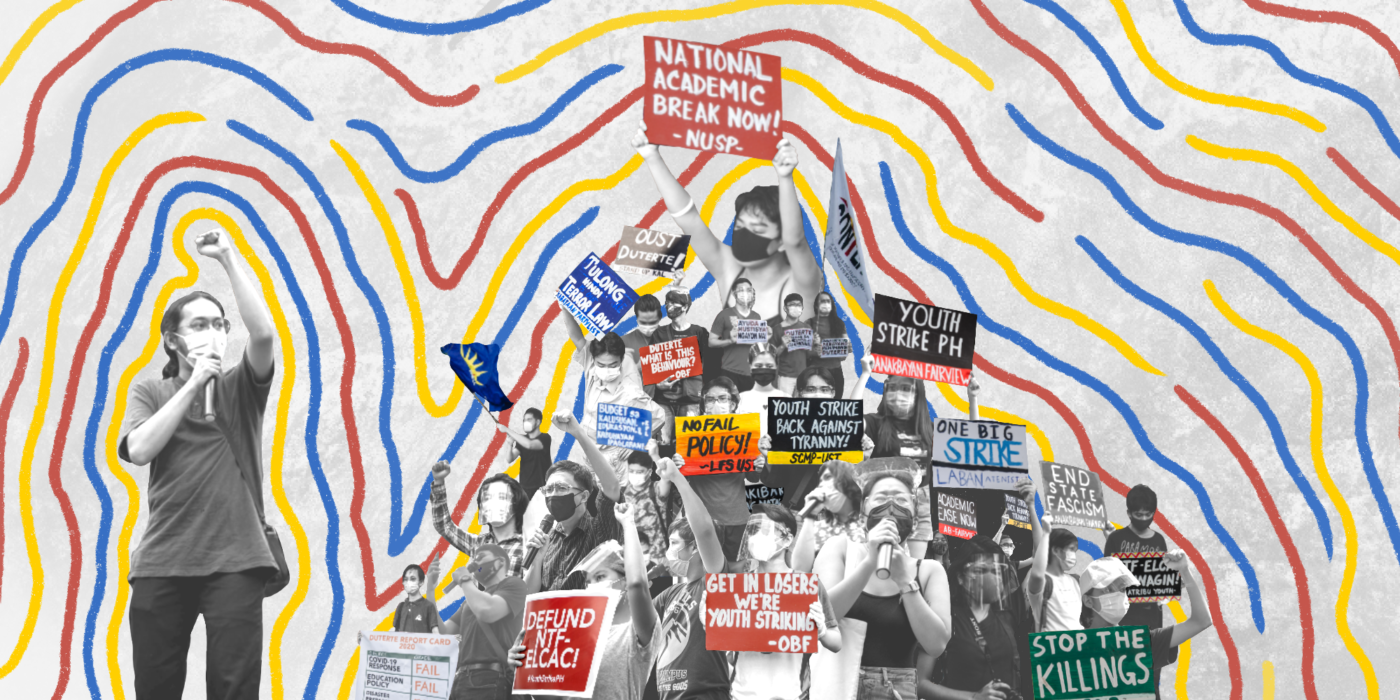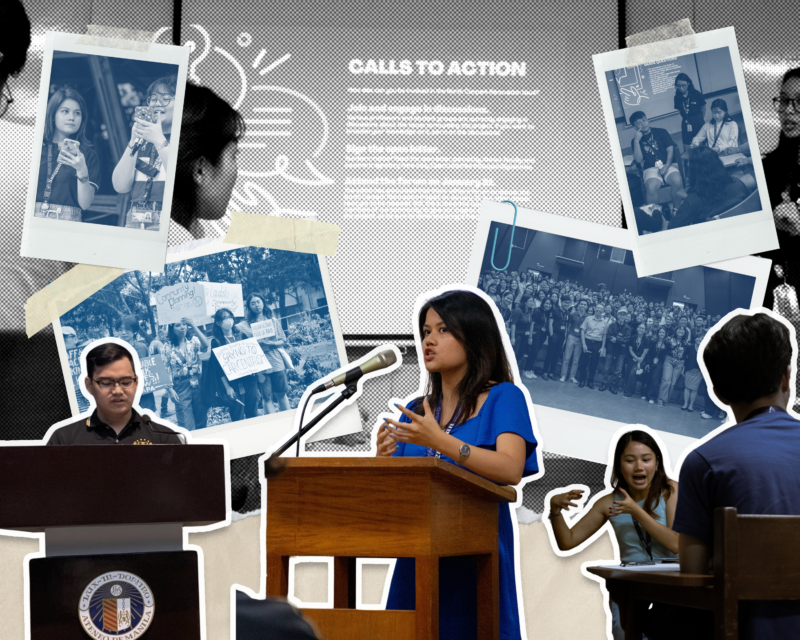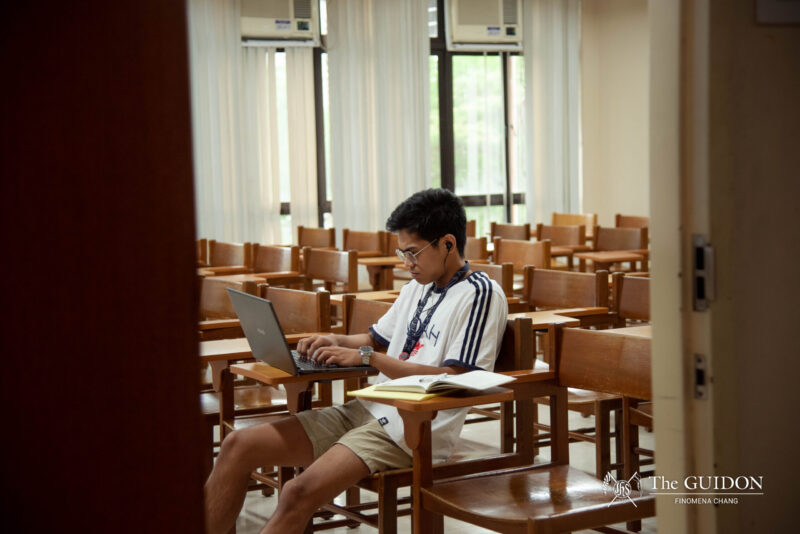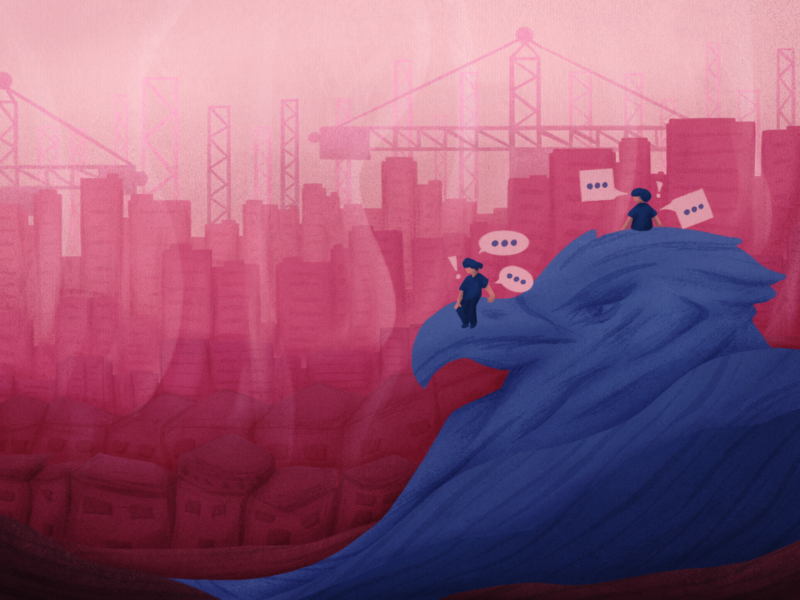THE COUNTRY finds itself besieged on two fronts: Facing the COVID-19 pandemic and a government imputed to cripple democracy. Attempting to rescue this ailing democracy, student political organizations (SPOs) seized the frontlines of dissent amid threats from the government. The passage of the Anti-Terrorism Law (ATL) and the abrogation of the University of the Philippines-Department of National Defense accord further placed SPOs in peril of unjust arrest and red-tagging.
Amid these dangers, SPOs managed to survive and endure a year in quarantine. Be it on the streets or online, they continue to redefine the face of student dissent and the exercise of freedom.
Striving to survive
Free speech is one of the hallmarks of democracy. For SPOs, educational discussions provide space to reach more people and tackle political issues with them. However, public health restrictions pushed these discussions to online platforms. “It’s so hard to organize events, to get people to attend [them], and to get the message across,” Samahan ng Progresibong Kabataan (SPARK) National Spokesperson John Lazaro notes.
For some other SPOs, however, building an online community was the challenge. Akbayan! Youth – Loyola (A!YL) is among the political organizations that launched its online presence during quarantine. A!YL Chairperson Eddie Jolongbayan shares that their organization still tries to build rapport through weekly discussions among their members.
Despite the operational adjustments these SPOs had to make, Jolongbayan says they are committed to continuing their protests and educating their members online even if quarantine restrictions have already eased.
Aside from these physical limitations, SPOs had to grapple with the passage of ATL in the midst of a nationwide lockdown. “[The government wants] to suppress students’ rights and academic freedom,” says One Big Fight for Human Rights and Democracy (OBFHRD) Convener Heather Andres of the ATL. Amnesty International Asia-Pacific Regional Director Nicholas Bequelin also said that this law may ease the government’s efforts to arrest even its mildest critics.
The passage of the ATL is also complemented by the National Task Force to End Local Communist Armed Conflict’s red-tagging of several universities in the country, including the Ateneo. Red-tagging poses grave threat to persons and groups accused of being left-leaning, communists, or terrorists, says the Commission on Human Rights.
Kabataan Party-List Representative Sarah Elago maintains that red-tagging Philippine universities is an attempt to intimidate and discredit the youth. “[Red-tagging] certainly puts pressure on educational institutions, thereby threatening their academic freedom and institutional autonomy,” she states.
This threat is not without an example. Kabataan Party-list Youth – Katipunan Chairperson Marco Miguel Mañaol shared with The GUIDON that one of their members was red-tagged and harassed online by a troll-operated Facebook page. He noted that this constituent took time off from their organization activities after the incident.
Despite this experience, Mañaol asserts that their members are not fearful, and are instead more driven to their cause. “I am part of the masses and they are one with me. If I am to be affected by the Terror Law, I’ll gladly accept it,” Mañaol says.
Discord and dissonance
With these threats at hand, Political Science Instructor Arjan Aguirre fears that there may be an exhaustion of youth activism as demand for manpower in mobilizations increases. He explained that the enticement to dissent might lead students to experience mobilization fatigue, a phenomenon explained to plague activists after consistent participation in demonstrations.
Aguirre also notes that online protesting has yet to reveal its “real potential.” He observes that these online engagements only inform audiences of what they already know, as online infrastructures are bubbles shared by like-minded users with similar political sentiments. These bubbles, also referred to as echo chambers, further shrink the spaces for productive discourse and growth among SPOs.
Apart from fighting echo chambers, Jolongbayan highlights the importance of time management among student activists. He cites this in light of other priorities such as family and academics. Moreover, Mañaol amplifies that their mental health is also at risk as socio-political issues become more frustrating to deal with. While SPOs have been making efforts to address this through kumustahan nights and workshops, Lazaro sees that the mental health crisis will continue as the pandemic drags along.
Despite these internal struggles, SPOs still persistently move forward with their own principles and advocacy. Versatility, above everything else, has become a priority for activist organizations as new issues come to light.
Hand in hand
With safe spaces for discourse and demonstrations decreasing, SPOs turn to Ateneo as a stage for protest. Vice President for Social Development Rizalino Rivera emphasizes that the Ateneo will continue to welcome all political ideologies and practice academic freedom. Together with the Associate Dean for Student Formation Leland Dela Cruz, PhD, Rivera recommended a maximum tolerance policy to the Loyola Schools administration, which will allow student activists to mobilize on campus.
On a University-wide scale, Rivera notes that efforts and partnerships with the Ateneo Law School and the Ateneo Human Rights Center are ongoing. This collaboration aims to provide free legal aid for Ateneans who find themselves in conflict with the law as they participate in protests.
Moreover, Rivera also states that Ateneo is in full cooperation with Congress in drafting policies concerning educational institutions and their academic rights. For bills related to red-tagging and academic freedom, Rivera has attended congressional hearings on behalf of University President Roberto Yap, SJ.
With all these efforts and more, however, SPOs wish for more support and solid stances from the administration. SPARK and OBFHRD, among others, wish for the LS administration to shorten the process of raising concerns as national issues are becoming even more pressing. While the interviewed SPOs recognize that their actions and statements may not gather full agreement from the Ateneo administration, they remain willing to coordinate with the University.
Rivera states that they are determined to keep communication lines open with Ateneo SPOs. “I think it’s important to keep on talking and to keep on listening to one another,” says Rivera.
As the Duterte administration continues to cultivate a culture of red-tagging and suppression, Elago reminds the youth to protect the freedom of speech especially on issues concerning their future. She sounds the alarm on the need to continue building a culture of empowerment in the opposition, as well as establishing safe spaces for dialogue.
In the end, movements such as those initiated by students and the youth are at the very center of upholding democracy especially in the face of suppression. Despite all the hindrances that come into play because of the pandemic, persistence remains the key in dissent. “We rely on the power of our unity and commitment to never allow ourselves [to be] intimidated and…cowered into silence,” says Elago, reaffirming the value of organizing.




